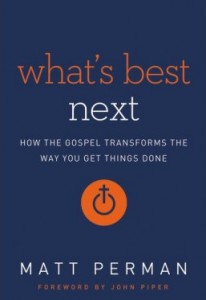 A review of What’s Best Next by Matt Perman. Published by Zondervan, available at the Bible Society online store.
A review of What’s Best Next by Matt Perman. Published by Zondervan, available at the Bible Society online store.
At first glance, a book on Christian productivity may seem like an odd duck. Do we need a book on productivity that’s distinctly Christian? Isn’t that a bit like a Christian book about cooking or aerobics? (Before you ask: yes, I wrote that as a joke, yes, I just googled it after writing it, and yes, it does exist.)
Matt Perman, the author of What’s Best Next, would answer with a resounding yes. Coming from a background in ministry, where he entered a high-pressure job with John Piper’s Desiring God ministry, he quickly became literate in productivity practice, but then he realised something. A lot of modern productivity practices centre on a wrong worldview: they’re centred on the self. They ask questions like, “how can I be more productive?”, “how can I achieve my goals faster?”, and “how can I be more successful?”
Instead, Perman argues for a Christian framework for productivity: that we need to first look to God as the centre of life, and thus, productivity. His aim is large: if we do this, Perman argues, we can change the world by being more effective in the goal of loving one another and thus, transforming the world. His theological framework here hews close to John Piper, because of his background, and, along with Piper, draws heavily from the works of the Puritans. In this context, that’s not a bad thing at all: there’s a lot of good material here about how living for God helps us find more of a purpose than when we live for ourselves.
As a sidepoint, I also like that he does write openly about God “to those who don’t share my faith perspective”. It’s an apologetic angle to the book that I wish more writers would take up: if Christians do hold God’s wisdom on how the world works, surely this should attract others to listen to what we have to say, and where we got it from.
It’s a book that’s easy to skim, with pithy chapters, summaries and excerpts of interviews with various experts in their fields. However, I admit I found something about the acronym-heavy, blog-ready style slightly wearing to read, but this is more a preference than a drawback. Also, I suspect this style will make it easier to use as a reference book in the long run.
However, I also wonder how helpful the actual productivity practices that he advocates will be for the chronic procrastinator, or classic underachiever. In a brief bio at the start of the book, it becomes clear that even before becoming literate with productivity practice, Perman is and was, by nature, driven and an overachiever. And I wonder how much of what he advocates will actually translate to people who are just not built like that.
All in all, it’s definitely worth reading, especially for the minister or executive who is tempted to reach for books from the corporate shelf about how to organise their life or get things done. What’s Best Next provides a thorough theological foundation for how you view the quest for productivity, and what that means in the life of a Christian: in that sense, it’s in a distinct field of its own. Just don’t be surprised if for the actual nitty-gritty on how to put it in practice, you end up returning to the corporate shelf.
Email This Story
Why not send this to a friend?
